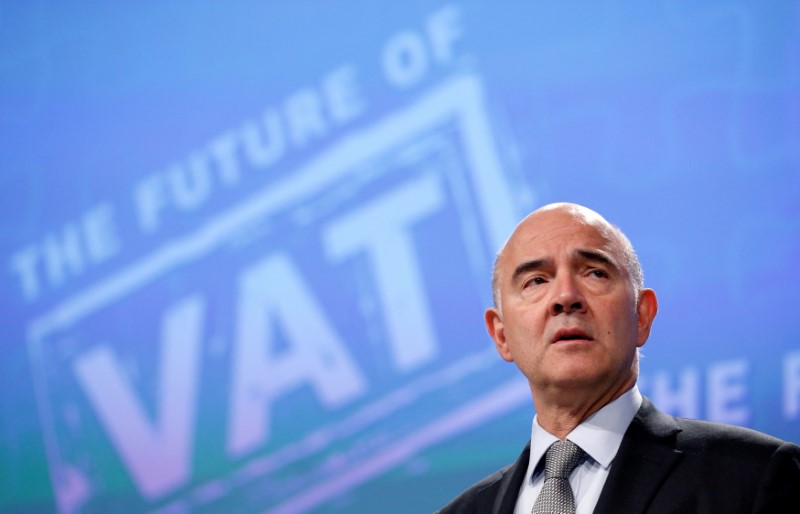 © Reuters. EU Economic and Financial Affairs Commissioner Moscovici presents a VAT reform proposal in Brussels.
© Reuters. EU Economic and Financial Affairs Commissioner Moscovici presents a VAT reform proposal in Brussels.By Jan Strupczewski
BRUSSELS (Reuters) – Wealthier and poorer euro zone countries must equalize their living standards if the single currency is to retain political support, the European Commission’s top economic official said.
Euro zone governments and institutions are discussing ways to deepen their economic integration after the sovereign debt crisis started in 2010 threatened the very existence of the single currency, now used by 19 countries.
Bailouts to five countries that lost market access during the crisis, financed by those better off, have added to a wave of anti-EU populism, fueled by voter uncertainty over the effects of globalization.
“Economic and social divergences matter for the euro area for its daily functioning but also for its political acceptability,” European Commissioner for Economic and Financial Affairs Pierre Moscovici said in a speech on Thursday.
“They undermine the promise of shared prosperity, which was central to the creation of the euro in the first place. And they fuel populism in regions were inequalities have been felt more strongly,” he said.
He said that despite economic growth in the euro zone, there were very large differences between its economies.
Italy’s public debt was twice as high as the Netherlands’, Spain’s unemployment rate was three times that of Austria and Germany’s current account surplus was ten percentage points larger than that of France.
In terms of income, the top 20 percent of the EU population earned five times more than the bottom 20 percent in 2015 while almost 120 million people in the wider European Union of 28 countries, almost a quarter of the entire population, lived in households facing poverty or social exclusion.
“For the euro to reach its full potential, we cannot let these economic and social divergences persist. The Economic and Monetary Union (EMU) is our main tool for convergence in the euro area,” he said.
Moscovici said that to help the economies and living standards in euro zone countries converge, the Commission was pushing for the creation of a euro zone budget.
“It would allocate financing in case of a deep recession which would be paid back over time in economic good times. By construction such a scheme would be in balance over a business cycle and does not imply permanent transfers,” he said.
The idea has the support of France, which has spoken in favor of a budget of several hundred billion euros. But Germany is against it, saying that in a stable monetary union such a budget was unnecessary.
The Commission is also proposing to provide incentives within the existing EU budget for reforms that would help convergence, an idea that has the backing of the chairman of euro zone finance ministers Jeroen Dijsselbloem.
First mentioned by Commission President Jean-Claude Juncker in September, such a convergence instrument would give pre-accession help to countries working toward euro adoption.
But a dedicated pool of money for the euro zone could also play the role of a European Investment Protection Scheme, a European Unemployment Reinsurance Scheme or a rainy day fund, the Commission said.
Fusion Media or anyone involved with Fusion Media will not accept any liability for loss or damage as a result of reliance on the information including data, quotes, charts and buy/sell signals contained within this website. Please be fully informed regarding the risks and costs associated with trading the financial markets, it is one of the riskiest investment forms possible.
Source: Investing.com


























